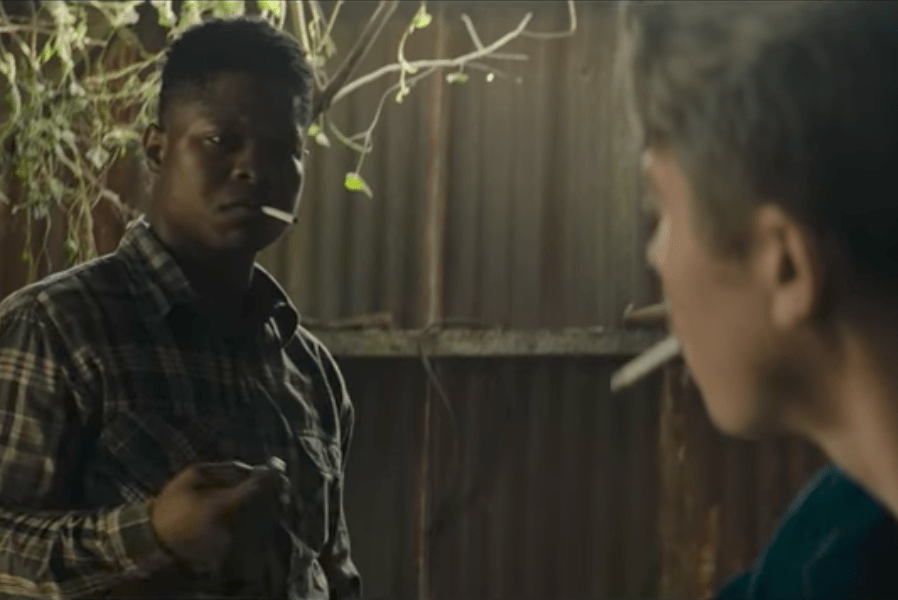One Mississippi, Two Mississippis: Dee Rees’ ‘Mudbound’
The epic film portrays an ambitious portrait of Americans struggling with race and class in the aftermath of World War II. Ronsel Jackson (Jason Mitchell) and Jamie McAllan (Garrett Hedlund) in "Mudbound." (Screen shot via YouTube)
Ronsel Jackson (Jason Mitchell) and Jamie McAllan (Garrett Hedlund) in "Mudbound." (Screen shot via YouTube)
If the racist sees only the color that divides people and the humanist the love that unites them, then Dee Rees is a filmmaker whose humanity is river-deep.
“Mudbound” is Rees’ intimate epic of the McAllans and the Jacksons, landowners and sharecroppers picking cotton cheek by jowl in the Mississippi delta. As World War II rages, relations between the two clans inch closer. After the war, tensions turn into contentiousness. As Shakespeare wrote of the Montagues and Capulets, the McAllans and Jacksons are both alike in dignity. And also in sacrifice: One has sent a brother and the other a son to fight in Europe.
Based on Hillary Jordan’s 2008 novel, the involving, multicharacter drama has six narrators—three McAllans, who are white, and three Jacksons, who are black. Rees’ infinite empathy with each of them enables viewers to experience the same event from multiple perspectives and appreciate the symmetry of their lives. Pressures between the two clans exacerbate the fissures within in each family. Although all the characters live close to the bone, Henry McAllan (Jason Clarke) looks down on the Jacksons because he is white, treating them more like his slaves than his tenants.
The film opens in 1946, as the McCallan brothers, Henry and Jamie (Garrett Hedlund), dig a grave for their father, Pappy (Jonathan Banks), an unapologetic white supremacist still fighting the outcome of the Civil War.
From this scene Rees flashes back to 1941, as stolid Henry courts Laura (Carey Mulligan), grateful to be saved from spinsterhood. She is better suited to his brother, Jamie, who is of kindred literary and romantic bent. But Jamie is flirty and flighty where Henry is dependable. Soon Henry and Laura have two daughters, and move from the city to a farm on the Delta with Pappy.
The Jacksons, presided over by Hap (Rob Morgan) and Florence (Mary J. Blige) are their tenants. They are a unit, as close to each other as the McAllans are somewhat distant. Soon their eldest, Ronsel (Jason Mitchell) is off to the Army as a tank commander in Europe, and Jamie signs on to the Air Corps.
In the first half of the film (evocatively shot by Rachel Morrison, whose every landscape is bathed in celestial light), the audience better gets to know Henry and Laura, and Hap and Florence by listening to their inner thoughts via voice-overs. The Jacksons hope to someday buy their own land, in no small part because they want to be free from Henry’s demands. To make some extra money, Florence, who reluctantly realizes she doesn’t enjoy the luxury of loving only her own children, agrees to help Laura with hers, and the women develop a growing respect for each other.
The film’s second half unfolds after the war when, shaken up in different ways, Ronsel and Jamie return from Europe. Over there, Ronsel was a liberator and American hero and had a lover (who was white). Back home, he’s treated like dirt by the white locals, especially Pappy, who neither recognizes his service nor his bravery. Jamie, an ace draped with medals, is celebrated but feels like a fraud. Today doctors would diagnose him with post-traumatic stress disorder.
Jamie correctly senses that Ronsel will understand what he is going through. Marinated with copious amounts of whiskey, the war heroes develop a friendship that gives both solace, but puts Ronsel, who is viewed by local racists as uppity, in peril.
Individually, the performances are deeply moving, not so much acted as lived-in. Collectively, the ensemble is overwhelming. Rees, who also co-wrote the screenplay, has made a quantum leap from “Pariah,” her 2011 debut feature, to this ambitious group portrait of Americans. It’s the best movie I’ve seen this year.
“Mudbound” opens in theaters today and is available on Netflix.
Your support matters…Independent journalism is under threat and overshadowed by heavily funded mainstream media.
You can help level the playing field. Become a member.
Your tax-deductible contribution keeps us digging beneath the headlines to give you thought-provoking, investigative reporting and analysis that unearths what's really happening- without compromise.
Give today to support our courageous, independent journalists.






You need to be a supporter to comment.
There are currently no responses to this article.
Be the first to respond.